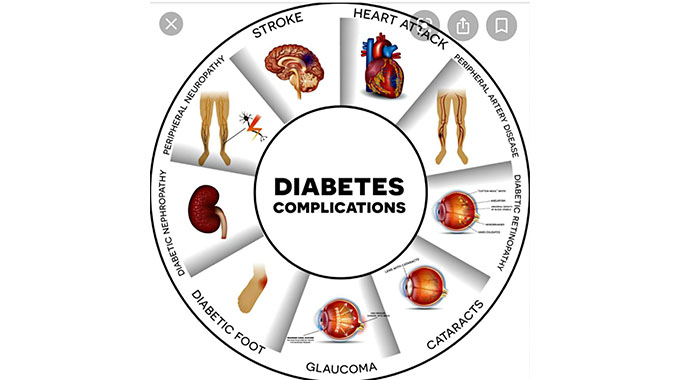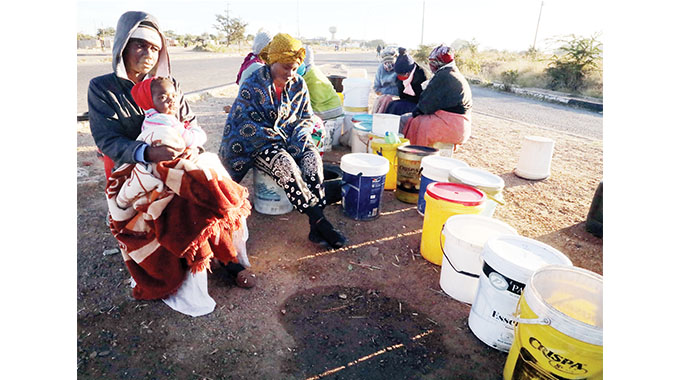Chronic disease management in lockdown

Thandeka Moyo-Ndlovu, Health Reporter
SCORES of people suffering from chronic illnesses, especially diabetes, have been struggling to access medication due to worldwide Covid-19-induced lockdowns which have affected transportation of medicines.
HIV, high blood pressure and kidney patients have also been affected by essential medicine shortages or astronomic costs where available.
People suffering from diabetes are struggling to access blood glucose test strips which are used to check if one’s sugar level is still within an acceptable range.
Under normal circumstances, diabetics should use the strips at least twice per day to avoid the risk of developing complications.
Diabetes is a prevalent chronic disease in Zimbabwe that occurs either when the pancreas does not produce enough insulin or when the body cannot effectively use the insulin it produces.
Insulin is a hormone that regulates blood sugar.
People with diabetes are at increased risk of developing cardiovascular disease which is a major cause of death and disability in people with diabetes, and a barrier to sustainable development.
According to the World Health Organisation, diabetes is a major cause of blindness, kidney failure, heart attacks, stroke and lower limb amputation.
Managing it, monitoring sugar levels and taking medication regularly are among the most trusted ways of managing the disease and avoiding complications.
In a survey, Chronicle discovered that most local pharmacies were in short supply of test strips and insulin.
The test strips cost about US$1 for two, Metformin and Glibenclamide insulin injections cost up to $12 000 for a month’s supply.
One of the affected patients, Ms Fungai Nkomo, said she was in great need of the strips as her glucose levels fluctuate daily leading to her passing out.
“I cannot live without those strips as I need to keep controlling my glucose level. I must check the levels after every meal and when I do not, sometimes I feel my whole body shutting down,” she said.
“I went to every possible pharmacy in Bulawayo and they all said then strips were in short supply adding that they were struggling to ensure insulin is available. I also failed to get some of my tablets as pharmacists said there was a nationwide shortage,” she added.
For Mr Muzi Mathema, the challenge is not only the shortages but the high prices which made it difficult for him to adhere to medication.
“I am forced to spend more than $15 000 on medication just for me and my wife and both of us are retired; we literally depend on our children for survival. We are in desperate need of the medication and the strips because developing complications will be pricier as we can no longer afford health care in hospitals,” he said.
“We wish there was a way we could access these without struggling so much. We are surely in a dilemma.”
Pharmaceutical Society of Zimbabwe president Mr Portifa Mwendera confirmed the nationwide shortages adding that people with hypertension and kidney disease were also affected.
He said the shortages were due to the Covid-19 outbreak which affected the importation of drugs and other materials used in the production of local drugs.
“Our pharmaceutical industry is more than 90 percent dependent on imports and we have been struggling ever since Covid-19 started. The situation is worse for those with chronic ailments as we rely 100 percent on imports and since there are limited flights coming in, the situation has been dire,” said Mr Mwendera.
He said part of their challenge was the availability of forex to order medication and other consumables from abroad.
“The situation is further worsened by forex transactions because we do not get as much forex as we need which means more time is needed to get the meds. However, over the past few weeks we have been seeing some countries like South Africa, China, South Korea and the United Kingdom relax their lockdown conditions which may ease the situation,” he said.
According to Mr Mwendera, orders were now taking at least four weeks to arrive in Zimbabwe which was better than when Covid-19 had just begun.
Dr Anele Bhebhe from Mpilo Central Hospital said it was dangerous for diabetic patients to skip medication or fail to access the strips as that leads to long term complications.
“High glucose levels affect the central nervous system, the heart, kidneys and some people become blind and may develop infections which may lead to amputations. We have two groups of patients that survive on insulin and patients that survive by taking medication,” said Dr Bhebhe.
“Those who use insulin are usually 30 years and below while the elderly do well with pills but with time, they may require insulin. It is strongly advisable that diabetic patients take their medication so that they avoid developing chronic kidney failure, heart diseases, loss of eye sight and even an impaired immune system.”
The Community Working Group on Health director Mr Itai Rusike said diabetes is very expensive to manage and called for improved domestic health financing in order to address new challenges such as the rising cases of non-communicable diseases.
“The Ministry of Health and Child Care (MOHCC) is facing serious challenges of diagnostics and continuity of care across all Non-Communicable Diseases (NCDs) including diabetes. Zimbabwe is currently the only country which hasn’t quantified the disease burden and therefore cannot address the management of NCDs holistically,” said Mr Rusike. “There’s need to carry out a rapid assessment of all services by MOHCC to get the clear picture as well as guide interventions moving forward because essential health services including for health conditions such as diabetes should be maintained even during the Covid-19 pandemic to avoid complications and death.” — @thamamoe











Comments